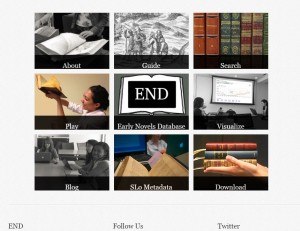Every reader of eighteenth-century literature is familiar with the paradox of the Google Books era: while the archive of digital texts has expanded exponentially in recent years, our ability to locate them has diminished. Even basic bibliographic details such as complete titles, prefatory materials, narrative forms, and tables of contents are often missing from digital facsimiles. The Early Novels Database (END) project reunites missing metadata with digital facsimiles of early fiction to make them easier to find and categorize. Uniting twenty-first-century data structures with the sensibility of eighteenth-century indexing practices, the project creates detailed metadata about novels published between 1660 and 1850. END captures detailed information about the organizational structures eighteenth-century readers relied on—title pages, tables of contents, author claims, narrative forms, prefaces, epigraphs, advertisements, and more. Transforming these paratextual elements into machine-readable, searchable data, END offers researchers and readers new ways of connecting and exploring digital collections of fiction. END’s metadata will also expand the possibilities of corpus analysis of early fiction, allowing users to create more sophisticated models of large full-text corpuses.
END is a collaborative, multi-institutional project based at the University of Pennsylvania and Swarthmore College. Faculty, staff, and fellows from both institutions lead a team of undergraduate researchers drawn from Penn and the Tri-College Consortium (Swarthmore, Haverford, Bryn Mawr) as well as Williams College. In Summer 2016, END is expanding to NYU’s Fales Library, whose rich holdings in early fiction will expand the END dataset significantly. After intensive training alongside the core END team based in Philadelphia, a team of NYU staff and students will catalog selections from the Fales Collection; expansion to additional New York repositories is planned for Summer 2017.

